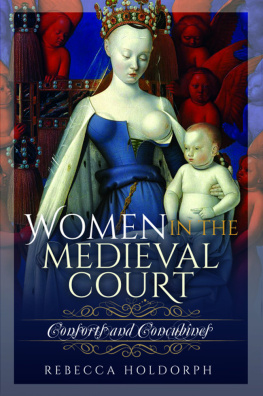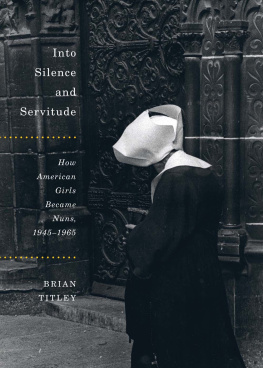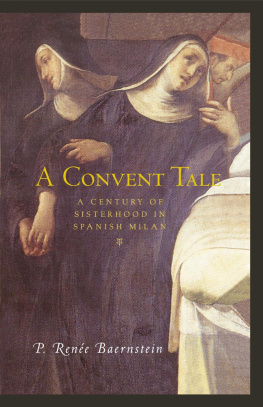
Sacred Hearts
Sarah Dunant
By the second half of the sixteenth century, the price of wedding dowries had risen so sharply within Catholic Europe that most noble families could not afford to marry off more than one daughter. The remaining young women were dispatchedfor a much lesser priceto convents. Historians estimate that in the great towns and city-states of Italy up to half of all noblewomen became nuns. Not all of them went willingly This story takes place in the northern Italian city of Ferrara in 1570, in the convent of Santa Caterina.
DAILY ORDER OF OFFICES IN A SIXTEENTH-CENTURY BENEDICTINE CONVENT
(Exact times will alter according to the hour of sunset and sunrise.)
LAUDS Daybreak
PRIME The first hour of the day
Refreshment
TERCE The third hour of the day Work hours
SEXT The sixth hour of the day Main meal of the day
NONES The ninth hour of the day
Work hours
V ESPERS
Before sunset
Smaller meal
C OMPLINE
Before retiring
M ATINS
2:00 A.M.
BEFORE THE SCREAMING starts, the night silence of the convent is already alive with its own particular sounds.
In a downstairs cell, Suora Ysbetas lapdog, swaddled like a baby in satin cloth, is hunting in its dreams, muzzled grunts and growls marking the pleasure of each rabbit cornered. Ysbeta herself is also busy with the chase, her silver tray doubling as a mirror, her right hand poised as she closes a pair of tweezers over a stubborn white hair on her chin. She pulls sharply, the sting and the satisfaction of the release in the same short aah of breath.
Across the courtyard two young women, plump and soft-cheeked as children, lie together on a single pallet, entwined like kindling twigs, their faces so close they seem almost to be exchanging breaths, the one inhaling as the other lets go: in, out, in, out. There is a slight sweetness to the airangelica, perhaps, or sweet mintas if they have both eaten the same sugared cake or drunk from the same spiced wine cup. Whatever they have imbibed, it has left them both sleeping soundly, their contentment a low hum of pleasure in the room.
Suora Benedicta, meanwhile, can barely contain herself, there is so much music inside her head. Tonight it is a setting of the Gradual for the Feast of the Epiphany, the different voices like colored tapestry threads weaving in and over one another. Sometimes they move so fast she can barely chalk them down, this stream of white notes on her slate blackboard. There are nights when she doesnt seem to sleep at all, or when the voices are so insistent she is sure she must be singing out loud with them. Still, no one admonishes her the next day, or wakes her if she slips into a sudden nap in the refectory. Her compositions bring honor and benefactors to the convent, and so her eccentricities are overlooked.
In contrast, young Suora Perseveranza is in thrall to the music of suffering. A single tallow candle spits shadows across her cell. Her shift is so thin she can feel the winter damp as she leans back against the stone wall. She pulls the cloth up over her calves and thighs, then more carefully across her stomach, letting out a series of fluttering moans as the material sticks and catches on the open wounds underneath. She stops, breathing fast once or twice to still herself, then tugs harder where she meets resistance, until the half-formed skin tears and lifts off with the cloth. The candlelight reveals a leather belt nipped around her waist, a series of short nails on the inside, a few so deeply embedded in the flesh beneath that all that can be seen are the crusted swollen wounds where leather and skin have fused together. Slowly, deliberately, she presses on one of the studs. Her hand jumps back involuntarily, a cry bursting out of her, but there is an exhilaration to the sound, a challenge to herself as her fingers go back again.
She keeps her gaze fixed on the wall ahead, where the guttering light picks out a carved wooden crucifix: Christ, young, alive, His muscles running through the grain as His body strains forward against the nails, His face etched with sorrow. She stares at Him, her own body trembling, tears wet on her cheeks, her eyes bright. Wood, iron, leather, flesh. Her world is contained in this moment. She is within His suffering; He is within hers. She is not alone. Pain has become pleasure. She presses the stud again and her breath comes out in a long satisfying growl, almost an animal sound, consumed and consuming.
In the next-door cell, Suora Umilianas fingers pause briefly over her chattering rosary beads. The sound of the young sisters devotion is like the taste of honey in her mouth. When she was younger she too had sought God through open wounds, but now as novice mistress it is her duty to put the spiritual well-being of others before her own. She bows her head and returns to her beads.
IN HER CELL above the infirmary, Suora Zuana, Santa Caterinas dispensary mistress, is busy with her own kind of prayer. She sits bent over Brunfelss great book of herbs, her forehead creased in concentration. Next to her is a recently finished sketch of a geranium plant, the leaves of which have proved effective at stanching cuts and flesh woundsone of the younger nuns has started passing clots of blood, and she is searching for a compound to stop a wound she cannot see.
Perseveranzas moans echo along the upper cloister corridor. Last summer, when the heat brought the beginnings of infection to the wounds and those who sat next to the young nun in chapel complained about the smell, the abbess had sent her to the dispensary for treatment. Zuana had washed and dressed the angry lesions as best she could and given her ointment to reduce the swelling. There is nothing more she can do. While it is possible that Perseveranza might eventually poison herself with some deeper infection, she is healthy enough otherwise, and from what Zuana knows of the way the body works she doesnt think this will happen. The world is full of stories of men and women who live with such mutilations for years, and while Perseveranza might talk fondly enough of death, it is clear that she gains too much joy from her suffering to want to end it prematurely.
Zuana herself doesnt share this passion for self-mortification. Before she came to the convent she had lived for many years as the only child of a professor of medicine. His very reason for being alive had been to explore the power of nature to heal the body, and she cannot remember a moment in her life when she didnt share his fervor. She would have made a fine doctor or teacher like him, had such a thing been possible. As it is, she was fortunate that after his death his name and his estate were good enough to buy her a cell in the convent of Santa Caterina, where so many noblewomen of Ferrara find space to pursue their own ways to live inside Gods protection.
Still, any convent, however well adjusted, trembles a little when it takes in one who really does not want to be there.
ZUANA LOOKS UP from her table. The sobbing coming from the recently arrived novices cell is now too loud to be ignored. What started as ordinary tears has grown into angry howls. It is Zuanas job as dispensary mistress, should things become difficult, to settle any newcomer by means of a sleeping potion. She turns over the hourglass. The draft is already mixed and ready in the dispensary. The only question is how long she should wait.
It is a delicate business, judging the depth of a novices distress. A certain level of upset is only natural: once the feasting is over and the family has left, the great doors bolted behind them, even the most devout of young women can suffer a rush of panic when faced with the solitude and silence of the closed cell.
Next page








